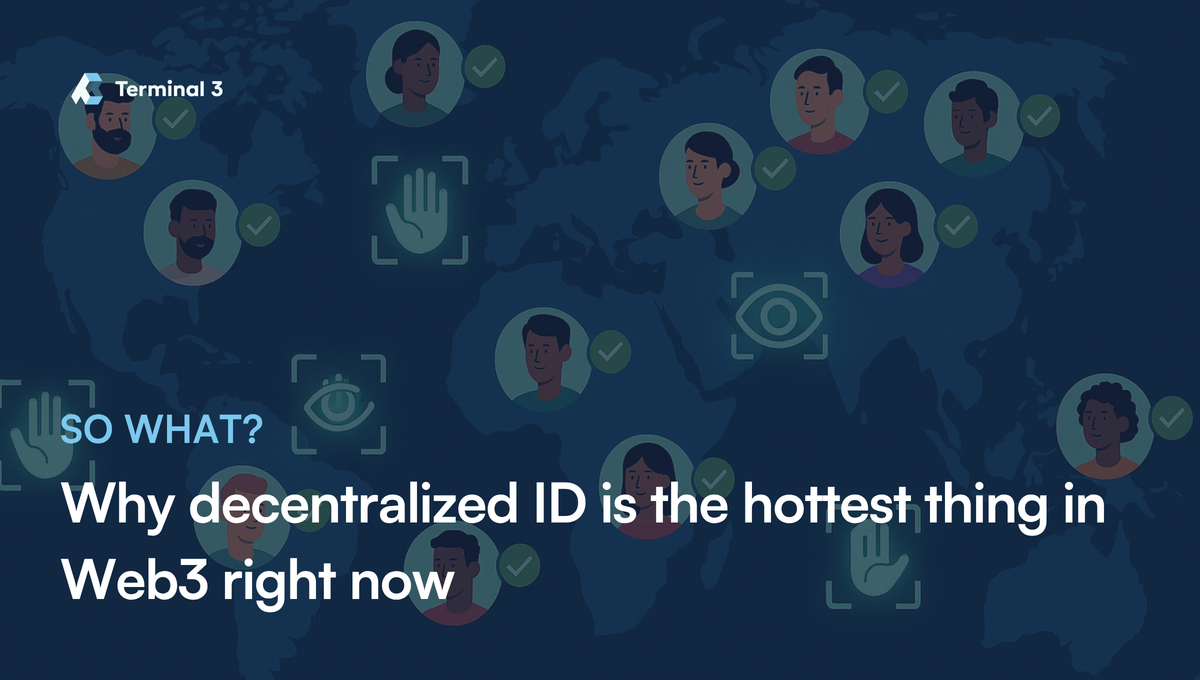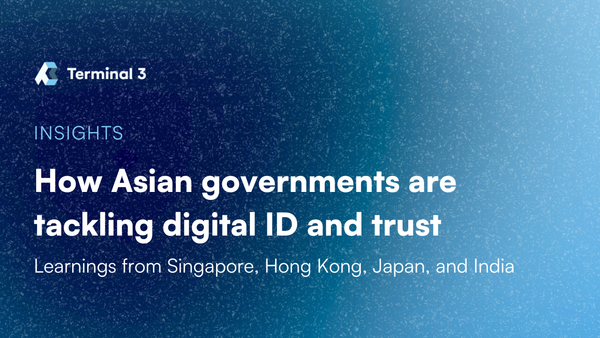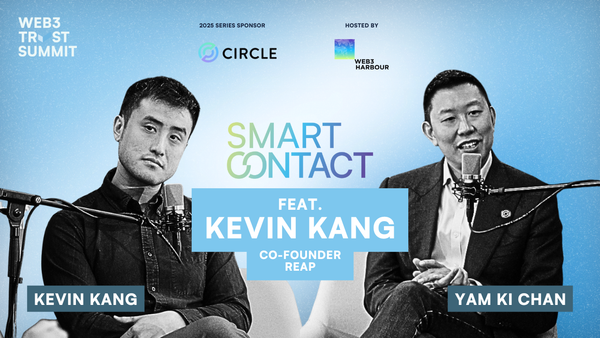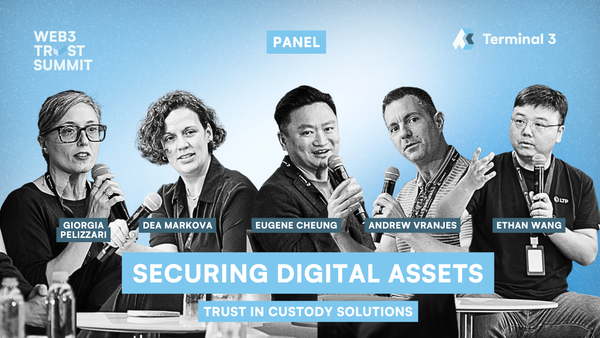Why decentralized ID is the hottest thing in Web3 right now

GM,
Decentralized identity is the hot topic in Web3 right now.
The launch of a token for the billion-dollar valued Humanity Protocol and World’s big-name partnerships with Tinder, Razer, and Visa mark a turning point: decentralized ID is finally going mainstream.
As AI blurs the line between real and fake, and data breaches expose millions, the need for reliable, human-first identity systems has never been greater. From bot detection to proof-of-personhood, decentralized ID could become a core pillar of Web3—and beyond.
A lot has happened since we covered the topic over a year ago—let’s dive in,
What’s going on?
Decentralized ID has been in the news in recent months after Humanity Protocol launched mainnet and released its token, while World has been on a tear with partnerships, signing up Tinder, Razer and even payment giant Visa.
Suddenly, the concept of using a decentralized platform to verify identification has real world use cases, although these are still relatively simple deployments that don’t fully convey the broader potential.
SO WHAT
1. Partnerships, partnerships, partnerships
World has made a sustained effort to strike partnerships over the last year, having rolled out crucial infrastructure that includes its token and user wallet.
The company took some time before it launched in the US, despite being conceived and headquartered there, as the regulatory landscape began to become clearer.
In the case of Razer, that’s mostly around its gaming ecosystem—including plans for a dedicated gaming tournament—as a method to authenticate users. A large part of Razer’s business is physical products such as gaming mice, keyboards and other peripherals. Related to that, the hardware-maker has plans to sell World’s Orbs, which now include a pocket device for users in an attempt to drive wider adoption.
In Tinder’s case, the dating app will offer World as a log-in option to prove a user isn’t a bot. That’ll start with a trial in Japan that could be expanded to other countries over time.
Reddit is among the companies said to be considering World for identification, according to a report from Semafor
In these cases, logging in via World is similar to using Google, Facebook or email as an authenticator except it has more precise information about a user and is resistant to bots or malicious activity. In the case of Tinder, it could help battle against fraud or scams, which commonly use romance as a vector to reach targets.
There have, however, been cases of World accounts being traded for use within nefarious activities. In Singapore, for example, migrant workers were paid upfront to create accounts that were then passed on.
2. Criticism from crypto royalty
That example from Singapore highlights that no system is immune from tampering when there are ultimately human beings behind them.
That point was made last week by Ethereum co-founder Vitalik Buterin in a blog that looked at the operational risks behind decentralized identification.
Vitalik Buterin sounded the alarm last week: tying your entire digital life to one decentralized ID is risky. He warned about privacy loss, government overreach, and centralized honeypots. Even ZK proofs, he said, can’t solve the human layer of corruption and coercion.
Furthermore, the manipulation of IDs could be a very serious issue given the amount of access that it could enable, or data it could hold.

It may sound counterintuitive but any ID system that holds too strong a market share faces peril, Buterin explained, as it becomes a target for attacks. It’s not hard to imagine a surge in World ID hacks or spoofs if the platform became key to establishing or verifying identification on key platforms. Much like passport fraud, it could become its own black market.
The Ethereum creator instead sees the future as a constellation of identification platforms, each secured using ZK proofs and ideally tied together in a way that doesn’t place too much emphasis on any part of the chain.
Interoperability is a core part of the Web3 movement, but it is hard to see at this early stage as rival platforms fight it out to grow their base of users, partnerships and more.
3. Reaching the mainstream
One of the first orders of business for decentralized ID protocols is to onboard more users. The major players have both taken different routes to achieving that goal.
Humanity Protocol launched its token in June. It uses palm scanning for verification but its methodology allows users to complete part of the process using their own device.
The concept is similar to World, but palm scans are designed to be less invasive. It uses vein scanning technology to complement the initial prints users take themselves via an Android mobile app.
Founder Terence Quok, who previously launched VC-backed startups, believes the ‘proof of humanity’ graph can grow the same way Facebook’s social graph did. Investors certainly agree. Animoca Brands, Pantera Capital and Jump Crypto were among the investors to put more than $20 million into the business at a valuation of $1.1 billion.

World, meanwhile, has finally put its focus on the US market—a region that seemed out of reach until the more crypto-friendly Trump administration came into office.
Those big name partnerships made a splash, but more impactful is the launch of World’s Orbs on American soil. These large camera-like contraptions scan a user’s iris to onboard them into the platform, and they’re now available in Atlanta, Austin, Los Angeles, Miami, Nashville and San Francisco with more to come.
But World is also betting that its users will become advocates. It is launching a portable device—Mini Orb—that will let existing World users verify others without them needing to visit the scanning centers.
Those who buy Mini Orbs—which World says it has spent millions of dollars developing—will earn rewards in World token for onboarding new users.
For now, that will be the sole use when they begin to ship in October. There’s hints it could be used for secure payments (think Apple Pay or other RFID solutions) further down the line, but that feels a long way off right now.

Decentralized ID is finally finding traction—but it’s not without flaws. Privacy, security, and adoption remain open questions.
The real test is whether these systems can scale without turning into the very gatekeepers they aim to replace.
News Bytes
Spain’s second largest bank is launching Bitcoin and Ethereum trading and custody services for retail customers
A previously-dormant Bitcoin ‘whale’ just moved over $8 billion in BTC—but nobody knows why or what it might mean
Robinhood now offers European users access to ‘tokenized’ US stocks to democratize access to capital markets—the move has attracted regulator attention and equally praised and denounced
Top DeFi company Ondo Finance acquired a regulated US broker to advance its plan to offer tokenized US stocks
China’s top tech firms are reportedly encouraging the government to explore issuing CNY-backed stablecoins to combat the dominance of digital tokens pegged to the US dollar
That’s all for this week!
Share your feedback, questions or requests via email to: sowhat@terminal3.io




